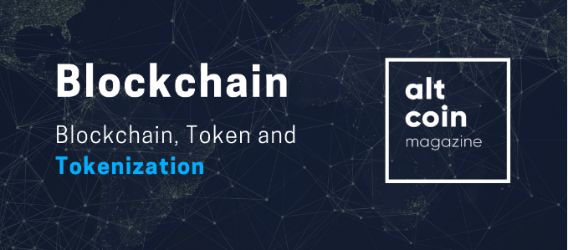Blockchain, Token and Tokenization
Helena Šagud
Adoption
5 years ago
1 QCP

To talk about blockchain technology today and not to talk about token or tokenization, is to exclude the basis of any future speculation.
I would, therefore, like to clarify what a token is, or rather what exactly tokenization means.
First of all, we need to take a step back: on the protocol of distributed registers that is the blockchain technology, we distinguish two types of values: cryptocurrencies (payment tokens), such as Bitcoins or Eths, to cite the most famous and widespread, also called native tokens, as they are physiologically inserted into a blockchain, which represents the "currency" of exchange for participants, within the same: tokens, which represent "tokens" or digital assets built on blockchain technology through tools such as smart contracts.
When we talk about tokenization, we mean the possibility of representing the value of a certain good or a certain action in many tokens, to store or exchange them on the blockchain. The tokenization is, therefore, the conversion of the rights of an asset into a digital token recorded on a blockchain, where the real good and the token are connected by an intelligent contract. Tokenization is a revolutionary new process, in which real-world goods become tokens, moving to a digital system on blockchain.
Investors can "liquefy" the resources of the real world while maintaining the characteristics of the asset. Tokenization increases portfolio diversification and spreads risk as investors can now co-own multiple assets simultaneously.
There are two aspects, therefore, the transformation of what is a "value" (e.g. a property, a patent, a copyright, etc.) into a token or the transformation of an "action" or a "work" into a token (e.g. reward systems already widely used by companies such as remuneration for plastic recycling or for the miles traveled using non-polluting means of transport).
The tokens are therefore liquid, immutable proof of a right, fractionable and exchangeable.
The blockchain, created in response to the 2008 banking crisis, represented an alternative payment system, in which each address was like an IBAN, with which crypto coins could be transferred between the participants.
Later on, the flexibility of this decentralized system was noted, which could also be used to record transactions that did not necessarily involve transfers of cryptocurrencies.
An example of the second evolution of decentralized technology was the social network, based on blockchain technology, born in 2016, Steemit, where all the typical activities of a social network, like, comment and post become transactions and where like can generate fees payable by the native Steem cryptocurrency.
...
https://medium.com/the-capital/blockchain-token-and-tokenization-cf430f9308e5
I would, therefore, like to clarify what a token is, or rather what exactly tokenization means.
First of all, we need to take a step back: on the protocol of distributed registers that is the blockchain technology, we distinguish two types of values: cryptocurrencies (payment tokens), such as Bitcoins or Eths, to cite the most famous and widespread, also called native tokens, as they are physiologically inserted into a blockchain, which represents the "currency" of exchange for participants, within the same: tokens, which represent "tokens" or digital assets built on blockchain technology through tools such as smart contracts.
When we talk about tokenization, we mean the possibility of representing the value of a certain good or a certain action in many tokens, to store or exchange them on the blockchain. The tokenization is, therefore, the conversion of the rights of an asset into a digital token recorded on a blockchain, where the real good and the token are connected by an intelligent contract. Tokenization is a revolutionary new process, in which real-world goods become tokens, moving to a digital system on blockchain.
Investors can "liquefy" the resources of the real world while maintaining the characteristics of the asset. Tokenization increases portfolio diversification and spreads risk as investors can now co-own multiple assets simultaneously.
There are two aspects, therefore, the transformation of what is a "value" (e.g. a property, a patent, a copyright, etc.) into a token or the transformation of an "action" or a "work" into a token (e.g. reward systems already widely used by companies such as remuneration for plastic recycling or for the miles traveled using non-polluting means of transport).
The tokens are therefore liquid, immutable proof of a right, fractionable and exchangeable.
The blockchain, created in response to the 2008 banking crisis, represented an alternative payment system, in which each address was like an IBAN, with which crypto coins could be transferred between the participants.
Later on, the flexibility of this decentralized system was noted, which could also be used to record transactions that did not necessarily involve transfers of cryptocurrencies.
An example of the second evolution of decentralized technology was the social network, based on blockchain technology, born in 2016, Steemit, where all the typical activities of a social network, like, comment and post become transactions and where like can generate fees payable by the native Steem cryptocurrency.
...
https://medium.com/the-capital/blockchain-token-and-tokenization-cf430f9308e5
- Blockchain technology
- Digital Assets
- Tokenization
- Decentralization
- Blockchain news
Confirm Delete
Are you sure, you want to delete the Comment ?